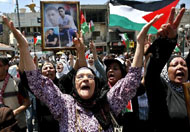
The mass hunger strike among Palestinian prisoners in Israeli jails that has been ongoing since April 17 came to an end on Monday, May 14, as an agreement was reached with Israeli Prison Authorities. The around 2,000 prisoners on hunger strike agreed to stop refusing food in exchange for improved conditions. Their protest centered on demands for more family visits, an end to solitary confinement and administrative detention.
A group of prisoners, held in administrative detention launched an earlier strike protesting their detention without charge. Hundreds of the almost 5,000 Palestinians currently imprisoned by Israel are being held under the illegal administrative detention policies, depriving them from the right to fair trials and legal representation. As the hunger strike ended on Monday, several of the detainees, including Bilal Diab and Thaer Halahla had gone for 77 days without food. According to the deal Israel agreed to provide the administrative detainees with a list of accusations or release them at the end of their term. Further, Israel has agreed to end solitary confinement for 19 prisoners and has lifted a ban on visits to prisoners by relatives living in the Gaza Strip.
As the hunger strikes came to an end, Palestinians commemorated the Nakba on Tuesday, May 15. The annual Nakba Day protests is set to memorialize the events in 1948 where Palestinians were forced from their homes with the establishment of the Israeli state. Especially important on this day was the Palestinians’ demands of the right to return to their land and insisting that they will not be forced out of their country. In a speech marking the anniversary President Mahmoud Abbas said "We will remain on our land… like our olive trees."
Palestinians rallied all over the country in demonstrations resulting in minor clashes between protesters and the Israeli military on several occasions. Medics say 63 Palestinians were injured by rubber bullets in clashes with Israeli forces outside Ofer jail near Ramallah, while 21 were hurt in a demonstration at Qalandiya checkpoint. Further, some 25 people were hurt in the Gaza Strip after Israel detonated equipment apparently intended to block protesters at the Erez crossing, according to medics and an Israeli army spokeswoman.
In other news, Palestinian President Mahmoud Abbas swore in a new cabinet in the West Bank on May 16. The Ramallah-based cabinet has been missing several members for months after a batch of resignations. The new 25-member cabinet includes 11 new ministers, whose portfolios include finance, national economy, Jerusalem affairs, health and justice. Salam Fayyad was retained as prime minister but had to relinquish his influential second post as finance minister. Nabil Kassis, a former university president who, like Fayyad, is politically independent, will take over as finance minister. He will have to deal with fiscal challenges posed by a steady decline in donor funds and by Israeli trade restrictions.
The shakeup was a result of the financial crisis in the West Bank-based Palestinian Authority and a deadlock over implementing a power-sharing deal with rival Hamas who control the Gaza Strip. Abbas, who heads Fatah, said that in spite of appointing a new cabinet of the Palestinian Authorities he has not given up on reconciliation with Hamas:
"If we have an agreement with Hamas tomorrow or afterwards, this government will not have any role," he told reporters in Ramallah.
"But I cannot wait forever. A number of ministers have resigned from the current government, and the administrative situation has paralyzed it, which forced me to announce this [new] government."
It has been more than a year since Fatah and Hamas agreed on a reconciliation deal in Cairo in an effort to end years of infighting, but it has come to nothing. The factions could not agree on who to appoint to a new transitional unity government which was to prepare for legislative elections scheduled to be held before the end of this month.
On May 14, European Union foreign ministers issued a detailed statement, accusing Israel of accelerating settlement construction and tightening its control over East Jerusalem at the expense of Palestinians. In the statement the EU foreign ministers express a deep concern over the development of the construction of illegal Israeli settlements in the West Bank. They further commented on the worsening conditions for Palestinians living in Area C - the 60 percent of the West Bank which is under Israeli control and where most Jewish settlements are located. Moreover, the announcement criticized settler violence against Palestinians. "The EU expresses deep concern regarding settler extremism and incitement by settlers in the West Bank," the statement read. "The EU condemns continuous settler violence and deliberate provocations against Palestinian civilians. It calls on the government of Israel to bring the perpetrators to justice and to comply with its obligations under international law.”
The EU announcement pointed to the illegality of the settlements according to international law and stated that the accelerated construction is a large obstacle to peace negotiations and to any hopes of a two state solution. Israel condemned the report as "biased" and said it would do nothing to help promote peace in the region.






